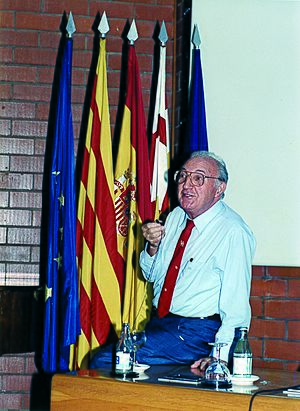Joan Oró facts for kids
Quick facts for kids
Joan Oró
|
|
|---|---|

Joan Oró i Florensa
|
|
| Born |
Joan Oro
October 26, 1923 Lleida, Spain
|
| Died | September 2, 2004 Barcelona, Spain
|
| Nationality | Spanish |
| Citizenship | US |
| Education | University of Barcelona |
| Alma mater | Baylor College of Medicine. |
| Known for | Research has been of importance in understanding the origin of life |
| Awards | Oparin Medal |
| Scientific career | |
| Fields | Biochemistry |
| Institutions | NASA |
| Thesis | (1956) |
Joan Oró i Florensa (born October 26, 1923, in Lleida, Catalonia, Spain – died September 2, 2004, in Barcelona, Catalonia) was a Spanish biochemist. He was a very important scientist who helped us understand how life might have started on Earth.
Oró worked on several NASA missions, including the Apollo mission to the Moon. He also helped with the Viking lander missions to Mars. He received the Oparin Medal for his amazing work in the field of origins of life. This award comes from the International Astrobiology Society.
Contents
Life and Work
Joan Oró studied Biochemistry at the University of Barcelona. In 1952, he moved to the United States. He did this because Spain did not have many scientific resources at that time. Four years later, he earned his PhD in Biochemistry in Houston.
In 1963, he became a full professor at the University of Houston. There, he started and led the department of biochemistry and biophysics. From the 1960s, he worked with NASA on the Viking missions. These missions explored the planet Mars. His work was key in checking samples from Martian soil. He helped explain why early ideas about finding life on Mars might have been wrong.
After Spain's transition to democracy, Oró also became involved in politics. He was a member of the Parliament of Catalonia. He also advised many USA projects and groups. These included those working on the International Space Station and future missions to Mars.
How Life Began
One of Joan Oró's most important discoveries was about how life's building blocks could have formed. He showed how adenine could be made from hydrogen cyanide (HCN). Adenine is a key part of DNA and RNA, which are the blueprints of life.
He also proved that amino acids could be made from HCN and ammonia in water. Amino acids are the building blocks of proteins. He made these discoveries between 1959 and 1962. His work, along with the Miller-Urey experiment, was a huge step in understanding how life might have started from simple chemicals. It opened up new ways to study how other parts of DNA and RNA could have formed.
Comets and Life's Beginnings
Oró was also the first scientist to suggest that comets brought important organic molecules to early Earth. Organic molecules are the carbon-based molecules that are the basis of life. He first suggested this idea in 1961. Today, many scientists agree with him.
For a long time, people thought about this idea. But only after space travel and studies of early Earth chemistry did we find strong proof. Comets have lots of carbon and water. They carry molecules like amino acids. In 1971, Oró and his team published a paper. It showed that the Murchison meteorite had many amino acids and other organic molecules. They also studied how these amino acids were shaped.
The Viking Mission to Mars
Joan Oró also helped explain some surprising results from the Viking mission to Mars. The Viking lander did several experiments on Mars. One experiment, designed by Oró, used a small gas chromatograph and mass spectrometer.
In one test, scientists mixed special nutrients with Martian soil. They saw a sudden release of carbon dioxide. At first, this made some think there were microbes (tiny living things) on Mars. These microbes would have been "eating" the nutrients. But Oró showed that a simpler, non-living explanation was more likely. He suggested that chemicals in the soil reacted with the nutrients. This reaction, called catalytic chemical oxidation, created the carbon dioxide.
Awards and Honors
Joan Oró received many awards for his scientific work. These include:
- The Cross of Civil Order of Alfonso X el Sabio (Madrid, 1983)
- The Alexander Ivanovich Oparin Medal Award from the International Society for the Study of the Origin of Life (ISSOL) (Berkeley, California, 1986)
- The Creu de Sant Jordi (1991)
- The Medalla del President Francesc Macià (2000)
In 2003, he was named Marquess of Oró by a special Royal Decree. He passed away in Barcelona, Catalonia, Spain, on September 2, 2004.
See also
 In Spanish: Juan Oró para niños
In Spanish: Juan Oró para niños
 | Aaron Henry |
 | T. R. M. Howard |
 | Jesse Jackson |

